11 nautical miles – about 20 km
We set off soon in the morning. A very good westerly wind is blowing, and we are able to set the mainsail with a double reef. Earlier, our friends from the Isle of Sheppey Sailing Club have been very helpful once again, giving us a lift to Clodia aboard their life raft.
 We have to cope with a painful separation: Our hearts are broken when we decide to leave behind our stove. Clodia is overloaded already and we have to make sure it’s reliable and light enough for Channel crossing.
We have to cope with a painful separation: Our hearts are broken when we decide to leave behind our stove. Clodia is overloaded already and we have to make sure it’s reliable and light enough for Channel crossing.
It’s a goodbye, not a farewell, though: Sooner or later a friend will bring the stove back to us. See you soon, warm travel companion!
Sailing is fantastic: we have to cover 11 miles only, helped by a strong tailwind, and in about two and a half hours we reach the channel that separates the gorgeous Isle of Sheppey from Withstable.
 Sticking to the spell that seems to have been cast over us lately, in the last two miles before destination the wind is our enemy: either it drops or it gets far too strong.
Sticking to the spell that seems to have been cast over us lately, in the last two miles before destination the wind is our enemy: either it drops or it gets far too strong.
This time it just vanishes and we have to get the oars out and start rowing. In a few minutes we reach Withstable beach.
There’s low tide so we decide to leave Clodia over this beautiful carpet of sand, stones and oyster shells. Quite soon, We meet the people from the Withstable Yacht Club: They kindly invite us to get inside of their building.
It’s here that we get in touch with an extraordinary man: Johnny Green, brother in law of Roland Poltock, our master shipbuilder. What we don’t know yet is that he once was the manager of one of the gratest British bands: The Clash.
What a surprise! In the following video you can see his interview:.
Johnny invites us in his marvellous house, where he lives with some of his children, full of maps, books and memories. Now his true passion is cycling, and he writes fantastic books about it.
We share some very pleasant days with Johnny, that offers us more than one dinner too. One day, very early in the morning, we visit an innovative Oyster farm, run by John Bayez.
He is trying to reintroduce to Withstable the native Oyster breed, that over the time have been fished off. His farm is fascinating and Massimo Di Nonno, our photographer, takes some nice shots.



John also gives us a bag of super-fresh Oysters, that we have for lunch with extreme satisfaction.
 Our days pass by working on Clodia and meeting lots of nice people.
Our days pass by working on Clodia and meeting lots of nice people.
The coast guard, and officer Colin in particular, advises us about the extra equipment we would need for Channel crossing, such as stronger life vests, radar reflector and safety rocket.
Crossing the Channel is no joke, so we are trying to prepare the boat to set out safely, by using these days of forced waiting caused by bad weather. In the meantime we also take a rest, getting ready for the months to come.
We have a very small boat, so we need to look after every detail.
 Whitstable is a beautiful city, lived by kind people. It has seen the world’s first railway line, in 1830, the “Canterbury and Whitstable Railway”. What a place to stop for a project about sustainable travelling!
Whitstable is a beautiful city, lived by kind people. It has seen the world’s first railway line, in 1830, the “Canterbury and Whitstable Railway”. What a place to stop for a project about sustainable travelling!
Finally we wish to mention Richard Green, a friend that has helped us a lot. His company, the Whistable Oyster Fishery Company, is very committed about water protection. Richard also owns a delightful restaurant where the main course is, obviously, based on Oysters from his farm. Learn the story of Withstable Oysters straight from his mouth:
See you soon.
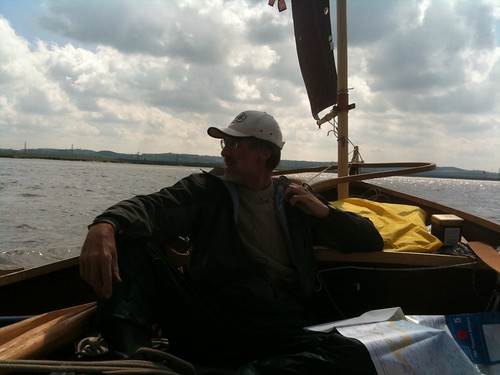 We leave Erith under a cloudy sky: Shortly afterwards it rains. We travel fast, by using both the Mainsail and the Mizzen, keeping a seven-knot speed. The stream kindly gives us three and a half of them.
We leave Erith under a cloudy sky: Shortly afterwards it rains. We travel fast, by using both the Mainsail and the Mizzen, keeping a seven-knot speed. The stream kindly gives us three and a half of them.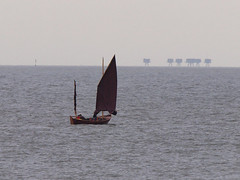 The wind changes, hitting our noses, and the sea gets bigger. We try to pinch for about an hour, gaining half a mile: Then the stream changes and the wind gets stronger yet.
The wind changes, hitting our noses, and the sea gets bigger. We try to pinch for about an hour, gaining half a mile: Then the stream changes and the wind gets stronger yet.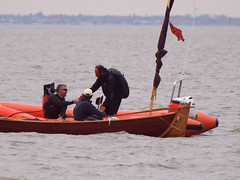 In a few minutes we are landed. James Bell, the Club’s Commodore, with a few fellows come to greet us with great kindness, offering to moor Clodia to a close boa. I go alone: Jacopo will come to pick me up shortly afterwards, aboard a little dinghy.
In a few minutes we are landed. James Bell, the Club’s Commodore, with a few fellows come to greet us with great kindness, offering to moor Clodia to a close boa. I go alone: Jacopo will come to pick me up shortly afterwards, aboard a little dinghy.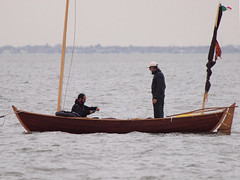 In a blink of an eye, Jacopo re-emerges, swearing as I never heard him before! He’s so upset that he turns up the dinghy by sheer anger, and swims toward me pulling it. I come close to let him get aboard Clodia (hypothermia is not unlikely under these conditions), steering with an oar towards shore and towing the dinghy full of water.
In a blink of an eye, Jacopo re-emerges, swearing as I never heard him before! He’s so upset that he turns up the dinghy by sheer anger, and swims toward me pulling it. I come close to let him get aboard Clodia (hypothermia is not unlikely under these conditions), steering with an oar towards shore and towing the dinghy full of water.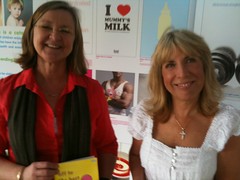 We sleep as children, then in the morning Tim wakes us up (
We sleep as children, then in the morning Tim wakes us up ( Thanks Isle of Sheppey Sailing Club. You are our friends.
Thanks Isle of Sheppey Sailing Club. You are our friends. Let me apologize for being so late, but things have been quite intense over the past few days.
Let me apologize for being so late, but things have been quite intense over the past few days.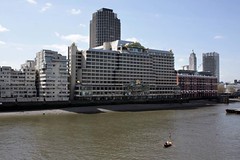 While crossing the Greenwich meridian we are greeted by a nice side wind and we can raise the Main Sail, at last. It seems a good omen, but shortly afterwards the wind changes back and hits our noses…
While crossing the Greenwich meridian we are greeted by a nice side wind and we can raise the Main Sail, at last. It seems a good omen, but shortly afterwards the wind changes back and hits our noses… 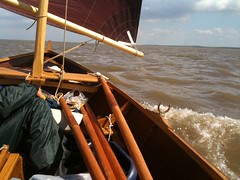 Then, after Tilbury, the Thames returns to look more natural, despite the industrialization process has left its footprints in several ways. We are downstream for all six hours of navigation: Its power pushes us toward the sea, notwithstanding the opposite wind.
Then, after Tilbury, the Thames returns to look more natural, despite the industrialization process has left its footprints in several ways. We are downstream for all six hours of navigation: Its power pushes us toward the sea, notwithstanding the opposite wind.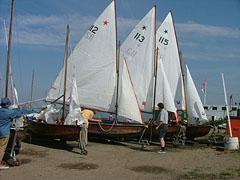 Yes, of course!
Yes, of course! Then we fire up the stove to cook an unsalted cous-cous (we don’t own any salt whatsoever): At last we jump into the tent and over the glorious mattresses made by Stefania Carniato of Imbotex, for a memourable sleep.
Then we fire up the stove to cook an unsalted cous-cous (we don’t own any salt whatsoever): At last we jump into the tent and over the glorious mattresses made by Stefania Carniato of Imbotex, for a memourable sleep.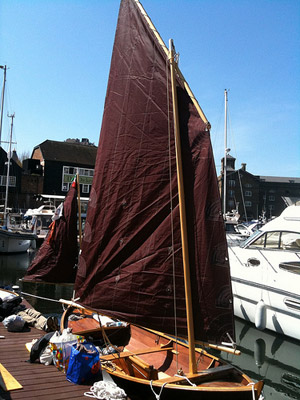 We have made it! We are in London, under Tower Bridge (which, seen from below is not as pretty as I’d hoped!).
We have made it! We are in London, under Tower Bridge (which, seen from below is not as pretty as I’d hoped!).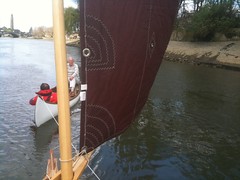 Clodia is super! A few minor outfitting jobs and we’re ready to face the Channel.
Clodia is super! A few minor outfitting jobs and we’re ready to face the Channel.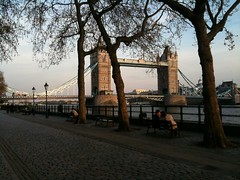 Even at St Katharine Docks, a fabulous mooring below the London Bridge where we are surrounded by luxury boats, people are very friendly. They come to see Clodia and talk to us, both astonished and happy. We get thanked for what we are doing: It makes us feel good.
Even at St Katharine Docks, a fabulous mooring below the London Bridge where we are surrounded by luxury boats, people are very friendly. They come to see Clodia and talk to us, both astonished and happy. We get thanked for what we are doing: It makes us feel good. Now I’m in Ali’s house, an old university fellow of mine. His generosity and hospitality has moved our hearts. Thanks for everything, forever, to Ali and his wife Anne, great friends.
Now I’m in Ali’s house, an old university fellow of mine. His generosity and hospitality has moved our hearts. Thanks for everything, forever, to Ali and his wife Anne, great friends.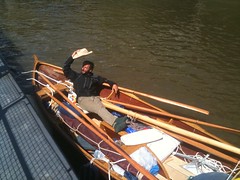 Before that to happen, I want to thank the fishes, the sky, the air and the wind of this gentle and generous Country.
Before that to happen, I want to thank the fishes, the sky, the air and the wind of this gentle and generous Country.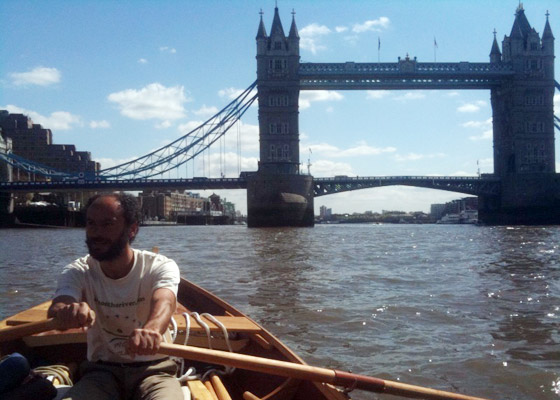
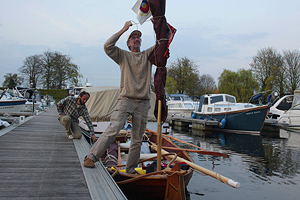 After the days spent in Wargrave at the Bushnell Marina, things took up a brisker pace. Colin Henwood, who has built many a famous boat for the Thames (see the
After the days spent in Wargrave at the Bushnell Marina, things took up a brisker pace. Colin Henwood, who has built many a famous boat for the Thames (see the 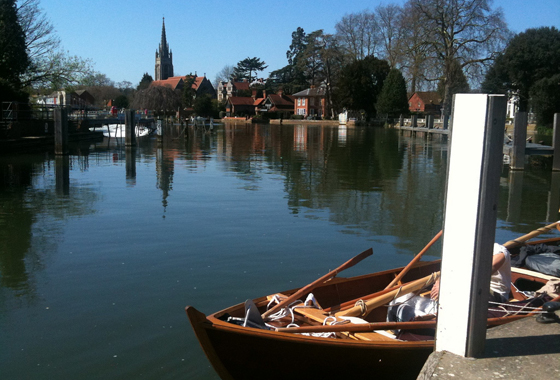
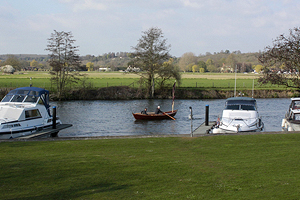 This evening we reached Chertsey, in Surrey, after passing Windsor (the castle is amazing!).
This evening we reached Chertsey, in Surrey, after passing Windsor (the castle is amazing!).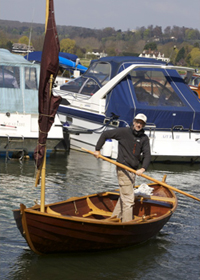 Clodia is doing just fine. Today, with only the mizzen raised, we were even able to sail on some breeze. It was another day with lots of encounters, we will tell you more about soon.
Clodia is doing just fine. Today, with only the mizzen raised, we were even able to sail on some breeze. It was another day with lots of encounters, we will tell you more about soon.






















